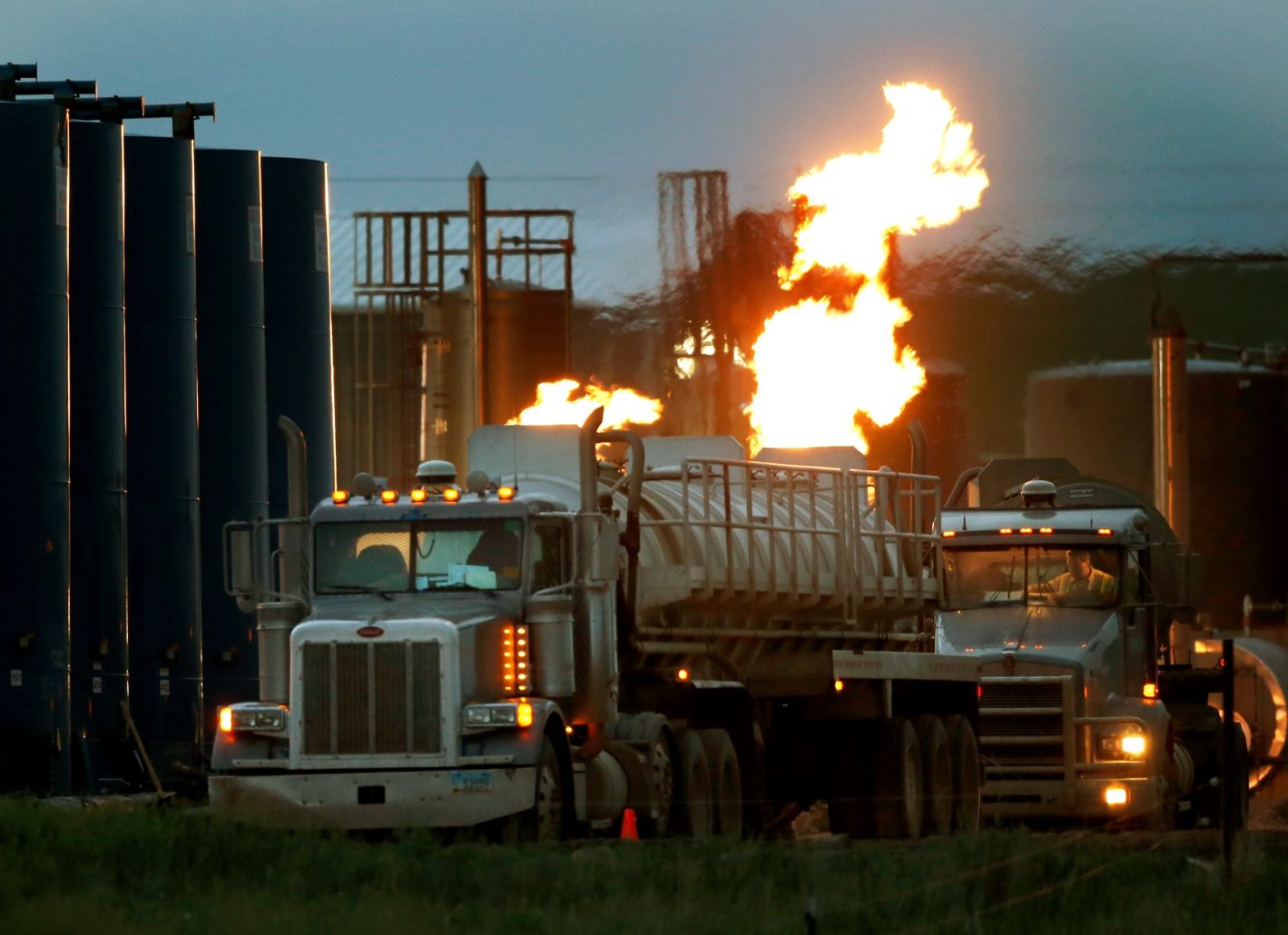SEC Proposes Rules to Improve Company Climate-Related Disclosures for Investors

WASHINGTON — Publicly-traded companies, hedge funds and others may soon have to disclose the greenhouse gas emissions they produce and how climate risk affects their business under new rules proposed Monday by the Securities and Exchange Commission.
Under the proposal changes adopted on a 3-1 vote by the SEC board, public companies would have to report on their climate risks, including the costs of moving away from fossil fuels, as well as risks related to the more intense storms, drought and higher temperatures brought on by a changing climate.
They would be required to lay out their transition plans for managing climate risk, how they intend to meet climate goals and progress made, and the impact of severe weather events on their finances.
Investor groups and climate activists have long sought mandatory disclosure of information on greenhouse gas emissions that would be uniformly required of all companies. Though the SEC issued voluntary guidance along these lines more than a decade ago, mandatory rules have never gotten as far as they did Monday.
“I am pleased to support today’s proposal because, if adopted, it would provide investors with consistent, comparable, and decision-useful information for making their investment decisions, and it would provide consistent and clear reporting obligations for issuers,” said SEC Chair Gary Gensler in a written statement.
“Our core bargain from the 1930s is that investors get to decide which risks to take, as long as public companies provide full and fair disclosure and are truthful in those disclosures,” he said.
“Today, investors representing literally tens of trillions of dollars support climate-related disclosures because they recognize that climate risks can pose significant financial risks to companies, and investors need reliable information about climate risks to make informed investment decisions,” Gensler continued.
“Today’s proposal would help issuers more efficiently and effectively disclose these risks and meet investor demand, as many issuers already seek to do. Companies and investors alike would benefit from the clear rules of the road proposed in this release. I believe the SEC has a role to play when there’s this level of demand for consistent and comparable information that may affect financial performance. Today’s proposal thus is driven by the needs of investors and issuers.”
The proposed rule changes would require a registrant to disclose information about:
(1) the registrant’s governance of climate-related risks and relevant risk management processes;
(2) how any climate-related risks identified by the registrant have had or are likely to have a material impact on its business and consolidated financial statements, which may manifest over the short-, medium-, or long-term;
(3) how any identified climate-related risks have affected or are likely to affect the registrant’s strategy, business model, and outlook; and
(4) the impact of climate-related events (severe weather events and other natural conditions) and transition activities on the line items of a registrant’s consolidated financial statements, as well as on the financial estimates and assumptions used in the financial statements.
For registrants that already conduct scenario analysis, have developed transition plans, or publicly set climate-related targets or goals, the proposed amendments would require certain disclosures to enable investors to understand those aspects of the registrants’ climate risk management.
The proposed rules also would require a registrant to disclose information about its direct greenhouse gas emissions and indirect emissions from purchased electricity or other forms of energy. In addition, a registrant would be required to disclose GHG emissions from upstream and downstream activities in its value chain, if material or if the registrant has set a GHG emissions target or goal that includes Scope 3 emissions.
In a fact sheet distributed ahead of the meeting, the SEC said the new requirements would be phased in over several years. Larger companies would need to start disclosing climate risks in fiscal year 2023, while others would have until fiscal year 2024.
Companies will get an extra year beyond those dates to include supplier and customer emissions and to get emissions data audited.
These proposals for GHG emissions disclosures would provide investors with decision-useful information to assess a registrant’s exposure to, and management of, climate-related risks, and in particular transition risks, the SEC said.
The proposed rules would provide a safe harbor for liability from Scope 3 emissions disclosure and an exemption from the Scope 3 emissions disclosure requirement for smaller reporting companies.
Scope 3 emissions are the result of activities from assets not owned or controlled by the reporting organization, but that the organization indirectly impacts in its value chain.
The proposed disclosures are similar to those that many companies already provide based on broadly accepted disclosure frameworks, such as the Task Force on Climate-Related Financial Disclosures and the Greenhouse Gas Protocol.
Under the proposed rule changes, accelerated filers and large accelerated filers would be required to include an attestation report from an independent attestation service provider covering Scopes 1 and 2 emissions disclosures, with a phase-in over time, to promote the reliability of GHG emissions disclosures for investors.
Scope 1 emissions are direct greenhouse (GHG) emissions that occur from sources that are controlled or owned by an organization (e.g., emissions associated with fuel combustion in boilers, furnaces, vehicles).
Scope 2 emissions are indirect GHG emissions associated with the purchase of electricity, steam, heat, or cooling. Although scope 2 emissions physically occur at the facility where they are generated, they are accounted for in an organization’s GHG inventory because they are a result of the organization’s energy use.
The proposing release will be published on SEC.gov and in the Federal Register as early as Tuesday. The comment period will remain open for 30 days after publication in the Federal Register, or 60 days after the date of issuance and publication on sec.gov, whichever period is longer.
Among those immediately commenting on the SEC proposal was the Retail Industry Leaders Association, which said it supports the SEC’s goal of providing investors with credible climate risk-related information.
“Climate change is a bigger threat than any one individual, company, industry, or government can address on its own and can only be abated through the collective efforts of all parties, and its members share the SEC’s concern about climate change and its potential impact on the U.S and global economies and our communities,” said Erin Hiatt, RILA vice president, for corporate and social responsibility.
RILA is in the process of reviewing the specifics of the proposed rule and will be working with retail members through RILA’s SEC Climate Disclosure Working Group to provide the SEC with recommendations for the final rule.
In a separate piece that came out just as the SEC meeting was ending, Douglas Peterson, president and CEO of S&P Global, released a paper that said the global economic transition to a more sustainable future is “both one of the most pressing challenges and greatest responsibilities we have in front of us as a society today.”
Toward that end, he wrote, one of the most important tools that companies and investors utilize to assess sustainability performance is an ESG score. An Environment, Social and Governance score is typically a headline number that presents the provider’s opinion of a company or entity’s performance against pre-defined ESG criteria.
“I believe strongly that financial markets can be a powerful force for good, and that transparent and rigorous ESG scoring is an essential tool for market participants to evaluate and optimize their societal impact,” Peterson wrote.
“It will be impossible for ESG scores to support progress on sustainability goals if measuring impact is not an integral part of an ESG assessment. Alongside impact, it is prudent to consider risk, e.g. future carbon pricing or physical risks, as part of this assessment. However, I would argue that an ESG score does not support the basic principles of ESG investing if it considers risk alone.”
Dan can be reached at [email protected] and at https://twitter.com/DanMcCue.

























